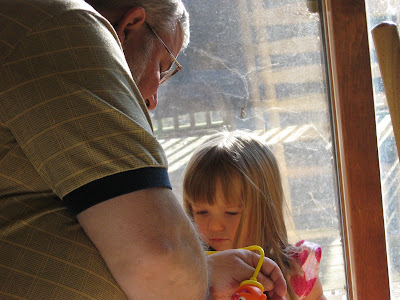While I don't want this to be a medical blog, I know many people are curious to learn about how Liz is doing health-wise.
It seems we're always worried about one medical issue or another, and I guess that will never change, but she's doing remarkably well.
I feel that we've been extraordinarily lucky and blessed given the very serious health problems that face people with achondroplasia. The only surgeries Liz had are for ear tubes. She's been under anesthesia a number of times for MRIs.
Before I began this blog, I started to read a few other blogs whose children have achondroplasia or a different form of dwarfism. In one blog, a baby with dwarfism died shortly after birth, and that's just another reminder of how truly lucky we are with Liz.
When she was first born, she had some health problems mostly respiratory related and was in the NICU for about 5 days.
Since then, we've had to see countless doctors and unfortunately Liz always seems to fall under the "borderline" category. Luckily, none of the "borderline" problems have escalated. At one point, Brian and I counted that Liz has about a dozen different doctors. We stopped counting.
One of the things that annoys me most about the public perception of achondroplasia or other forms of dwarfism is that people think that the condition is only cosmetic and there are no health-related issues. That's obviously completely false.
The good news though is even despite the medical conditions, people will achondroplasia can live full and healthy lives.
Liz has a mild form of spinal stenosis that has never required surgery, but we obviously keep close appointments with her neurosurgeon. This is the narrowing of the spinal cord and it can lead to compression of the cord, obviously a serious condition.
As I said, Liz's condition hasn't required surgery and in August we had a fabulous report from her neurosurgeon. After seeing him regularly for 3 years, we don't need to see him again for another 2 years. We were thrilled! We anticipate that her spinal stenosis will continue to improve as she ages.
Another major concern is hydrocephalus, which is described as fluid on the brain. Liz has never had this. However, we had a recent scare a few weeks ago. She kept complaining of headaches and we didn't understand why. Things got so bad, she was pushing her head on the ground. We wasted no time calling her doctors - about three of them - and rushed her to the hospital for a STAT CT. Luckily, everything looked fine. Unfortunately, it showed mastoiditis, which is an issue with the sinuses.
Of course, her doctor called me the next day and wanted to see her in 30 minutes, and we had to get her to her ENT. But we've learned that often times, her pediatrician and radiologists who read the reports, are very cautious. Once we see her specialists, we're often reassured. That's exactly what happened in this case. We saw the ENT and she felt that the mastoiditis was nothing more than ear fluid that had settled into the ears.
People with achondroplasia are at risk for hearing loss and often have dozens of ear infections and multiple sets of tubes. Liz has had many ear infections and two sets of tubes. She had hearing loss early on, but regained it.
Liz also has sleep apnea, but her type of apnea is not the fatal kind. She has obstructive sleep apnea, which impacts the amount of oxygen getting to the brain. The sleep studies have been torture for us to endure, but at this point she seems fine and hasn't had to sleep with an apnea monitor.
Every night that we had to spend at Children's Memorial in Chicago to complete the ongoing sleep tests were horrible. You'd think a sleep study would be a breeze. But imagine, hooking up a baby or a toddler to 100 wires and then telling her to sleep. Impossible.
Then, all night if her apnea occurred, alarms would start buzzing, and Brian and I were a wreck by the end of it. And we all just wanted to rush home and get some real sleep. Of course, we always had to bathe her because they use this sticky-solution to make sure the wires stayed on her body. Her sleep doctor still wants another sleep study, but at this point, we're holding off because she seems to be doing great!
There are a whole host of other medical-related issues with people with achondroplasia that I won't get into. Certainly, the bones are a big concern and we just saw Liz's bone specialist and he said right now her bones look great. That was a huge relief. She'll need to see him regularly for the rest of her life.
We also still continue to see Liz's geneticist - Dr. Z. She's one of my favorite doctors. I know I can call her at home or at work, anytime and she'll get back to me at her earliest opportunity. She saw Liz in the summer too and was absolutely thrilled with her progress. She gave Liz a cognitive test and she passed with flying colors.
She mentioned that Liz has lordosis, which is an inward curvature of the spine. We can do some exercises to help that condition, but there will be virtually no way to ever eliminate that. Down the road, this will cause back pain.
Like I said, these are most of the medical issues we've dealt with, and they've really been quite minor.








